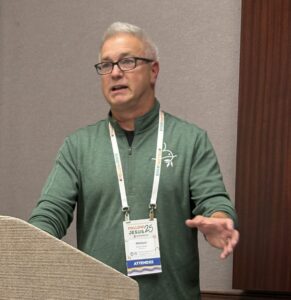
Michael Danner. (Photo by Cami Dager.)
Church leaders, pastors and board members gathered for a seminar on Thursday, July 10, titled “How to Supervise Your Pastor,” led by Michael Danner, associate executive director of Church Vitality for MC USA. Drawing on over 30 years of pastoral and denominational experience, Danner offered practical guidance and candid reflections on the unique challenges and best practices for supervising pastors in today’s congregational context.
“Pastors play a central role in the thriving of a faith community,” Danner said. “What pastors do is really important … They stand at this intersection between the lives of people in the church, the challenges of the world around us, and what the Scriptures say.”
“We also know that when a pastor is supervised well, it helps them to live healthy, well-balanced lives,” he added.
Danner highlighted the critical distinction between supervision and evaluation, noting that effective supervision is not micromanagement but rather “to grow and maintain a healthy relationship between the pastor and the church based on trust and mutual respect.”
He added, “Effective supervision happens in the context of a regular meeting between a supervisor and the pastor to review their work in a safe and positive environment.”
The seminar addressed the complexities of supervising pastors, including unrealistic expectations, unclear decision-making processes, the dual roles many church leaders play and the pastor’s ever-expanding job responsibilities.
“Functionally, as a pastor, your job description is what any one person thinks you should be doing,” Danner said, underscoring the need for clear, reasonable job descriptions and open communication. He noted that congregations often add stuff to pastors’ plates, not realizing that the plates are already full – and they don’t take anything else off.” Attendees murmured their affirmation.
Danner advocated for assigning one trusted individual to supervise the pastor, rather than a committee, to ensure accountability and support. “If it’s everybody’s responsibility, it’s nobody’s responsibility,” he said. He recommended that the trusted individual meet with the pastor, ideally, once a month.
He also drew a distinction between evaluation and supervision, saying, “Evaluation is focused on the big picture – mission, vision, how’s the church doing overall and how are people experiencing it?” Danner said. “Supervision focuses on day-to-day action and the realities of ministry life – the stuff that pastors experiences as they do their work.”
Attendees also discussed the importance of setting boundaries, managing confidential information, and providing regular reporting on pastoral work. “It is up to the pastors to do that and to do that well. And these are all the kinds of things that you should be talking about regularly with pastors,” Danner concluded.
For those who missed the seminar, Danner’s slides can be downloaded here.
Written by Cami Dager.

